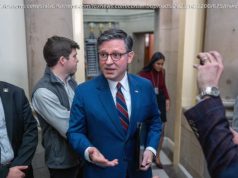Trump’s top political advisers are underscoring the political risks if he fires the deputy attorney general before November’s congressional elections
President Donald Trump has delayed until next week a meeting with Deputy Attorney General Rod Rosenstein to determine whether he’ll keep his job after reports he’d suggested secretly recording Trump.
“The president spoke with Rod Rosenstein a few minutes ago and they plan to meet next week,” White House press secretary Sarah Huckabee Sanders said Thursday in a statement. “They do not want to do anything to interfere with the hearing” related to sexual assault allegations against Supreme Court nominee Brett Kavanaugh.
Rosenstein, whose role includes overseeing Robert Mueller’s Russia probe, was scheduled to meet with Trump on Thursday, but the president had suggested in a new conference on Wednesday that he might delay the session to avoid conflicting with the Kavanaugh hearing.
“My preference would be to keep him and let him finish up,” Trump said of Rosenstein.
The veteran prosecutor’s future was thrown into doubt on Friday with a report in the New York Times that he had suggested to colleagues last year that he could secretly record conversations with the president and also discussed invoking the 25th Amendment that allows for removing a president who’s unfit.
They do not want to do anything to interfere with the hearing
Trump said Rosenstein assured him in a phone conversation that “he never said it. We’ll see.”
The president would have reason to keep him in the job, as Trump’s top political advisers are underscoring the political risks if Rosenstein is fired before November’s congressional elections, a White House aide said.
Over the weekend, Rosenstein resigned verbally to White House Chief of Staff John Kelly, who accepted the offer, but after the phone call with Trump on Monday, Rosenstein decided to stay on, people familiar with the matter have said. He’s now inclined to remain in the position.
The Justice Department declined to comment on the Trump-Rosenstein meeting.
White House advisers worry that Democrats could be further energized if it appeared Trump was forcing out Rosenstein in an effort to obstruct Mueller’s continuing investigation into Russia’s election interference, the aide said. A successor to Rosenstein could end or limit Mueller’s inquiry.
It wasn’t clear whether Trump will place any demands on Rosenstein at their meeting, such as asking him to recuse himself from overseeing Mueller’s probe, a person familiar with the matter said. Rosenstein isn’t likely to agree to such a demand, increasing the risk that he’d resign, the person said.
The reports on Rosenstein’s discussion with colleagues last year about covertly taping the president set off a firestorm in Washington, but the details remain in dispute. A person present at that meeting said Rosenstein was joking, but the New York Times, which first reported the incident on Friday, cited secondhand accounts indicating he was serious.
Rosenstein disputed the account. “I never pursued or authorized recording the president and any suggestion that I have ever advocated for the removal of the president is absolutely false,” Rosenstein said in a statement on Friday.
Trump said Wednesday that he spoke with Rosenstein about the reports.
“He said he did not say it, he said he does not believe, and nobody in this room believes it,” he told reporters.
Trump’s allies also have warned on Twitter and cable news that dismissing Rosenstein could interfere in the already tumultuous effort to win Kavanaugh’s confirmation. Fox News host Sean Hannity delivered a “message to the president” on his show Friday that firing Rosenstein would play into Democratic hands. He framed the reports about Rosenstein as a “set-up.”
Since the beginning of the Russia investigation, Trump’s legal advisers have privately raised questions about
Rosenstein’s oversight of the probe, suggesting he had a conflict because he was involved in Trump’s decision to fire former FBI Director James Comey. Mueller has been investigating whether Trump obstructed justice by firing Comey, as well as through other actions.
If Rosenstein stays on, he would likely face new scrutiny from House Republicans, who have accused him of withholding documents related to the Russia probe that they’ve sought.
Rep. Mark Meadows of North Carolina, who chairs the Oversight subcommittee on government reform, said he wants Congress to bring Rosenstein in for testimony again.
“He needs to come in the next week, or resign,” Meadows said. If neither happens, Meadows said, he has “plenty of tools in my toolbox.”






